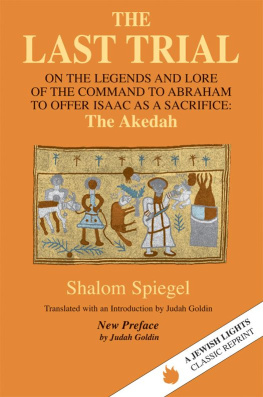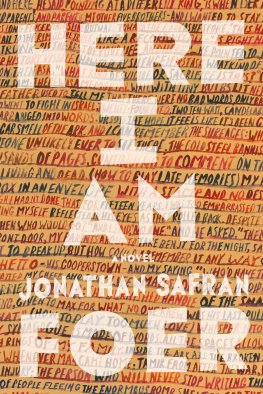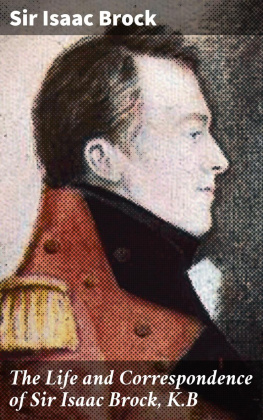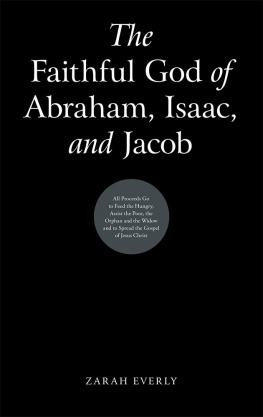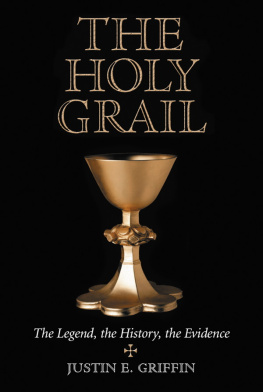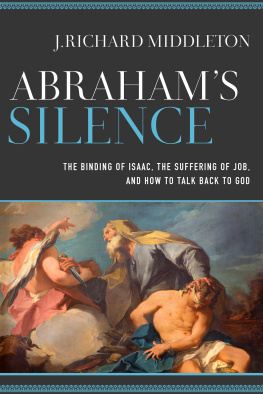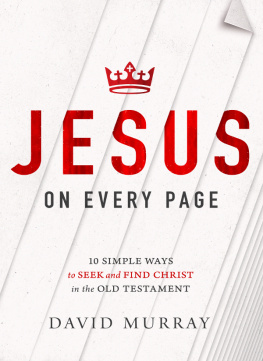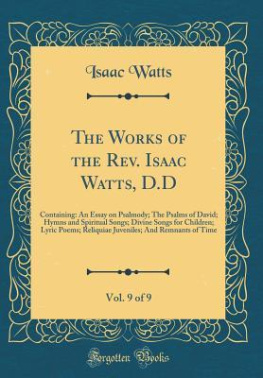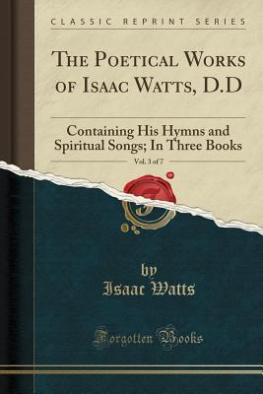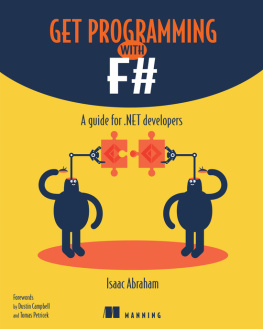

FRONTISPIECE: The Sacrifice of Isaac (Ismail), a single miniature from a manuscript of the Majmaal-twarikh by Hafiz-i Abr, prepared ca. A. D. 1425 for the library of Bysunghur, son of Shahrukh. School of Herat, Persia. See further below, pp. 40f., and cf. Introduction, p. xi, n.*.

CONTENTS
Send Us Your Feedback

Shalom Spiegels Me-Aggadot ha-Akedah, written as an introduction to a twelfth-century poem by Rabbi Ephraim of Bonn which Spiegel had decided to edit, comment on, and publish for the first time, appeared originally in 1950 as a contribution to the Jubilee Volume in honor of Alexander Marx. (Two supplements appeared in 1953 and 1964, also in Festschriften .) Spiegel generously sent me an offprint and it arrived a few days before the eve of Rosh Hashana. No holiday before or since so overpowered my limping religiosity, moods and fractured pieties as did that monograph. So in the ten days of that season I reread the work at least two more times. By Yom Kippur even the tiny shambling Iowa City synagogue no longer felt dilapidated, but like the right stage-setting for loud outcry. I think that an ornate upper-middle-class prayer houseOrthodox, Conservative, Reform, whatevercharacteristic of theatre auditoriums American prosperity has led to would not have roused the emotional response produced by my first readings of Me-Aggadot ha-Akedah in that nebbich midwest shul. But that may be sentimentality, if not worse.
Of course, there was Spiegels tiffany prose. Who in the world wrote such Hebrew? No wonder he was the envy (poorly disguised) of sundry colleagues. To be sure, in belletristic composition there was Agnon. But Spiegels ambition was not fiction of remembrance of east-European past. It was scholarship, text analysis with detailed documentation and footnotes and variant transcriptions: the impedimenta of reading for pleasure. Since elegance of style was typical Spiegel in all his writings and habitual speech, it was no surprise, but still a delight, to encounter it again. But this time, the theme! The command to Abraham to offer up his precious son as sacrifice: altar, fire, knife. Why, it was the very Torah-reading of the second day of Rosh Hashana. Inevitably Spiegels scholarly treatment of the beginnings of the theme through half the middle ages would lodge in the mind on that day. But its not dislodged even when that Genesis chapter is read in the routine annual cycle.
For the Akedah story, Genesis XXII, is indeed one of the most terrifying narratives in all of Scripture. Will nothing less than an order that the father with his own hand slay his favorite son satisfy the deity of a biblical patriarch? Is that a test or a reign of terror? So profound was the effect of this account on Jewish memory and speculation, every generation of Jews invoked it as leitmotif for its own trials and tragedies. It also penetrated deep into Christianity for its own purposes.
And the poem by Rabbi Ephraim of Bonn incorporated a statement so wild, it suspends credulity: that Abraham slaughtered twice! How take it seriously? Did the poet lose control of his rhetoric? So Spiegel undertook to prove that nothing wild, nothing exaggerated led the poet to say what he did. There were indeed two slaughterings, not one, and bystanders bore witness to it. Dont be astonished, therefore, that for the poet, angels on high cried out in extremis.
During the last two decades or so, it has been interesting to note how frequently the Akedah story has become the theme of a number of teachers and public lecturers. Except for sermons, I do not recall such frequent publicity announcements on campuses and in popular magazines before approximately the 1970s.
Naturally this is not to say that no one else (especially in the nineteenth century) discussed Akedah problems critically before Spiegel. He himself reviewed the works of a number of them. But it is definitely to say that I am familiar with no discussion of the theme as thoroughgoing, as erudite, as critical, as perceptive, as discovering as Spiegels. And, I want to add, as unhomiletical. And his identification of the original context of the eye-for-eye prescription is breathtaking.
The translation into English was undertaken when a New Haven colleague who could not read Hebrew protested bitterly, Here is obviously a very important study, and you people keep it to yourselves. So the American Council of Learned Societies sponsored its publication. Not long after the translation appeared, a copy was found lying on top of the desk of a leading art historian in Princeton. Forty-three years after its initial publication (and what years!) the book still addresses us directly, even if temporarily we postpone reflection on what the ram teaches. And since 1950, every time one recalls the Akedah , the mind translates: Shalom Spiegel on the Akedah.
J.G.
Swarthmore, PA
February 1993
B. | Babylonian Talmud. |
Davidson, Thesaurus | Israel Davidson, Thesaurus of Medieval Hebrew Poetry , New York, 1924-33. 4 vols. |
Ginzberg, Legends | Louis Ginzberg, Legends of the Jews , Philadelphia, 1909 ff. 7 vols. |
Habermann | A. M. Habermann, Sefer Gezerot Ashkenaz we-Sarefat , Jerusalem, 1945. |
HUCA | Hebrew Union College Annual. |
J. | Jerushalmi, the Palestinian Talmud. |
JBL | Journal of Biblical Literature. |
JQR | Jewish Quarterly Review. |
M. | Mishnah. |
Mann | Jacob Mann, The Bible as Read and Preached in the Old Synagogue , Cincinnati, 1940. |
MGWJ | Monatschrift fr Geschichte und Wissenschaft des Judentums. |
MhG | Midrash ha-Gadol, ed. M. Margulies, Jerusalem, 1947. |
Migne, P.G. and P.L. | J. P. Migne, Patrologia Graeca and Patrologia Latina (Patrologiae Cursus Completus), Paris, 1844-66. |
NS | A. Neubauer and M. Stern, Hebrische Berichte ber die Judenverfolgungen whrend der Kreuzzge , Berlin, 1892. |
PRE | Pirke R. Eliezer. |
R. | Rabbi. After the title of a biblical book: Rabba. After Pesikta: Rabbati. |
REJ | Revue des tudes juives. |
Salfeld | Siegmund Salfeld, Das Martyrologium des Nrnberger Memorbuches , Berlin, 1898. |
T. | Tosefta. |
ZAW | Zeitschrift fr die alttestamentliche Wissenschaft. |
Zunz, | L. Zunz, Literaturgeschichte der synagogalen Poesie , |
Literatur geschichte | Berlin, 1865. |

I
In 1950, corresponding to the year 5710 of the Hebrew calendar, the Jewish Theological Seminary of America published, under the editorship of Professor Saul Lieberman, a Jubilee Volume in celebration of Professor Alexander Marxs seventieth birthday. Professor Marx had served as professor of history and librarian of the Seminary since its refounding in 1903 by Solomon Schechter. The Jubilee Volume appeared in two parts, of 667 pages in English, of 547 pages in Hebrew. There were forty-five contributors from various parts of the United States, England, Central Europe, and Israel. Some of the contributions were of major, even formidable, importance for Judaica studies, and scholars are still drawing on those learned contributions for their continuing researches. Beyond any shadow of doubt, at least on my part, the outstanding study of the Festschrift is that by Professor Shalom Spiegel, Me-Aggadot ha-Akedah.
Next page
